Electric School Bus Education
These educational webinars and handouts provide information about the benefits of electric school buses and examples of their use. Explore the resources in this series called "Flipping the Switch on Electric School Buses" through these topics:

To suggest additional information and resources, email CleanSchoolBusTA@nrel.gov.
Find a step-by-step guide to the school bus electrification process in the Electric School Bus Planning Guide.
Electric School Bus Introduction
This technical assistance video series is for K-12 school districts interested in implementing electric school buses. The series kicks off with an introduction to Clean Cities and Communities and a discussion about how local Clean Cities and Communities coalitions can provide education and technical assistance throughout the implementation process, as well as an introduction to electric school buses, key decision factors, charging infrastructure, and vehicle availability.
Webinars
Clean Cities and Communities and Technical Assistance
This module introduces the Clean Cities and Communities partnership and discusses how Clean Cities and Communities coalitions can assist school districts in learning about electric school buses and connect districts and their fleets with technical assistance.
Electric Bus Basics and Key Challenges
This module introduces electric school buses themselves, key benefits and challenges, the basics of charging infrastructure, and vehicle availability.
Working with Electric Utilities
Part 2 of this series focuses on working with electric utilities. The video modules and associated handout provide guidance on starting the conversation with your utility and information on assessing your power needs for future charging infrastructure and understanding the various utility rate structures.
Webinars
Working with Your Utility Partner and Assessing Power Needs
This module discusses how to work with your utility and incorporate power need considerations into your plan.
Utility Rate Structures
This module discusses utility rate structures and how EV charging can impact your monthly bill.
Vehicle Requirements
Part 3 of this series focuses on vehicle requirements. The video modules and associated handout provide guidance about currently available electric school bus vehicle models and vehicle cost factors; how to analyze your vehicle routes to determine if electric is a good option for your fleet; vehicle range and efficiency considerations; and information on incentives, battery life, and other considerations like battery recycling.
Webinars
Vehicle Models and Cost Factors
This module discusses information on currently available electric school bus vehicle models and vehicle cost factors.
Route Analysis, Range, and Efficiency Considerations
This module discusses how to analyze your vehicle routes to determine if electric is a good option for your fleet, vehicle range, and efficiency considerations.
Incentives, Battery Life, and Other Considerations
This module discusses incentives to help offset up-front costs, battery life, and other considerations like battery recycling.
Handouts
Charging Infrastructure
Part 4 of this series focuses on charging infrastructure. The video modules and associated handout provide information about determining charging needs, selecting a charger, and important charging infrastructure installation considerations.
Webinars
Determining Charging Needs and Selecting a Charger
This module discusses how to determine charging needs and how to select a charger.
Installation Considerations
This module discusses charging infrastructure installation considerations.
Handouts
Infrastructure Planning and Solutions
Part 5 of this series focuses on charging infrastructure planning and solutions. The video modules and associated handout provide information on interconnection challenges and solutions, as well as an overview of vehicle-to-grid (V2G), including addressing the barriers and opportunities associated with this technology.
Webinars
Interconnection Challenges and Solutions
This module discusses electric school bus charging infrastructure interconnection challenges and solutions, including utility structure, grid and facility considerations, and possible interconnection solutions.
V2G Overview, Barriers, and Opportunities
This module discusses electric school buses with an overview of vehicle-to-grid barriers and opportunities.
Vehicle In Use Performance
Part 6 of this series focuses on vehicle in use performance. The video modules and associated handout provide information on how to track electric school bus performance and why it is important to do so, as well as electric school bus energy use and fuel economy, and information on electric school bus range and reliability.
Webinars
Tracking Performance
This module discusses how to track electric school bus performance and why it is important to do so.
Energy Use and Fuel Economy
This module discusses electric school bus energy use and fuel economy.
Range and Reliability
This module discusses electric school bus range and reliability.
Handouts
Driver and Technician Training
Part 7 of this series focuses on a training overview. The video module and associated handout provide information on how to provide driver and technician training on electric school buses.
Webinars
Training Overview
This module discusses electric school bus driver and technician training, including why training is important and the four basic levels of training.
Cost Factors
Part 8 of this series focuses on electric school bus cost factors. The video modules and associated handout provide information on bus capital and infrastructure costs, operational and maintenance costs, incentives and financing options, and how to have financing discussions.
Webinars
Bus Capital Costs and Infrastructure Costs
This module discusses bus capital costs and infrastructure costs.
Operational Costs
This module discusses electric school bus operational costs.
Maintenance Costs
This module discusses electric school bus maintenance costs.
Incentives and Financing Options
This module discusses electric school bus incentives and financing options.
Financing Discussions
This module discusses how to have financing discussions.
Handouts
More Resources
Clean School Bus Program: The Infrastructure Investment and Jobs Act (IIJA) provides $5 billion over 5 years for electric and alternative fuel buses. Each year, $500 million will be provided exclusively for EV buses and $500 million for EV and other alternative fuel buses. IIJA also provides up to $300 million for a new Joint Office of Energy and Transportation to provide and coordinate technical assistance to states and communities.
Electric School Bus Technical Assistance: In partnership with the National Laboratory of the Rockies and the U.S. Environmental Protection Agency, the Joint Office is offering technical assistance on a wide range of electric school bus deployment topics, including electric bus basics, charging equipment, utility connections, bus performance, and operational considerations like routing and maintenance.
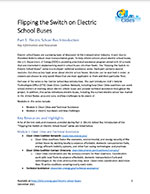 Part 1: Electric School Bus Introduction
Part 1: Electric School Bus Introduction
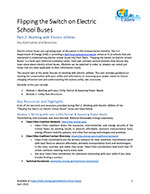 Part 2: Working with Electric Utilities
Part 2: Working with Electric Utilities
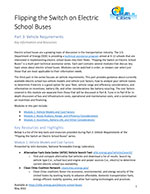 Part 3: Vehicle Requirements
Part 3: Vehicle Requirements
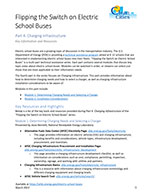 Part 4: Charging Infrastructure
Part 4: Charging Infrastructure
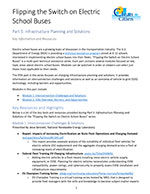 Part 5: Infrastructure Planning and Solutions
Part 5: Infrastructure Planning and Solutions
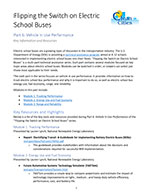 Part 6: Vehicle In Use Performance
Part 6: Vehicle In Use Performance
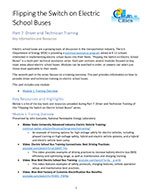 Part 7: Driver and Technician Training
Part 7: Driver and Technician Training
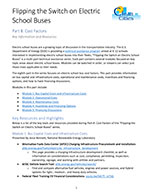 Part 8: Cost Factors
Part 8: Cost Factors